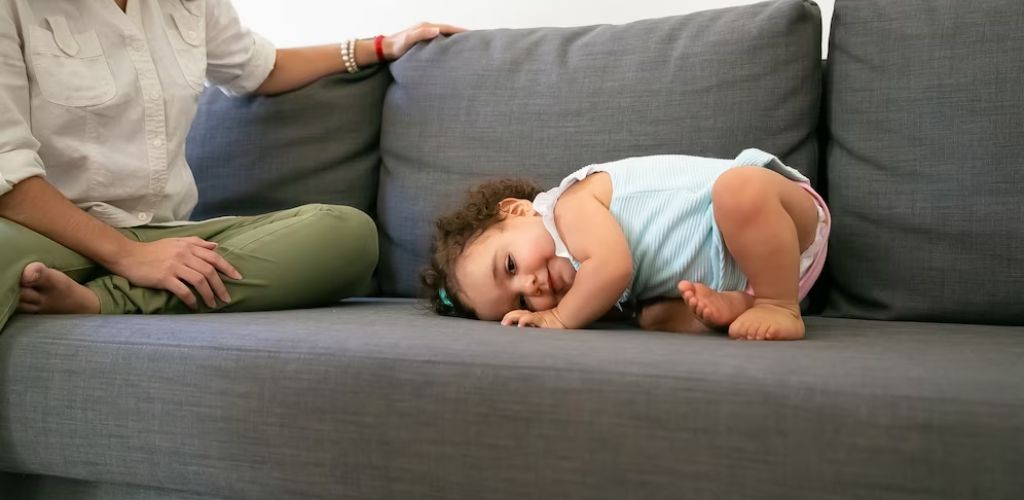
What is Diarrhea?
Diarrhea is a condition in which loose and watery stools are discharged during more-frequent bowel movements. It typically involves problems related to the stomach and intestine and is generally caused by a virus or unclean food.
Generally, if the watery stools happen up to 5 or more times,and this happens for seven to ten days, it is classified as diarrhea.
It is usually hard to know whether your infant is suffering from diarrhea or not, but it appears to be pale yellowish, soft, and runny. An infant’s diarrhea also consists of small pieces that look like seeds.
Note: Diarrhoeal disease is the second leading cause of death in children under five years of age. Annually, about 1.7 billion cases of childhood diarrhoeal disease are reported worldwide.
What are the different types of diarrhea in babies?
|
Types |
Description |
Symptoms |
|---|---|---|
|
Acute watery diarrhea |
The most common type of diarrhea that lasts up to several hours or days. |
Stomach flu, food poisoning, stools, mild fever, bacterial infection, etc. |
|
Acute bloody diarrhea |
It is the condition in which the baby’s poop contains blood. It is also known as Dysentery. |
Fatigue, nausea or vomiting, cramps, blood in stools, etc. |
|
Chronic diarrhea |
Chronic diarrhea lasts for more than four weeks. It is also called long-lasting diarrhea or persistent diarrhea. It can lead to shock or organ damage in infants. |
Loss of control of bowel movements, high fever, nausea or vomiting, bloody stools, chills, cramps, etc. |
What causes diarrhea in babies?
Diarrhea is one of the most common problems in infants. It is usually mild and brief. There are different factors which cause diarrhea in babies:
- Food: Diet plays a significant role in causing diarrhea as few items can lead to infection or allergies in a newborn. Eatables like spicy food, chocolates, or even cow’s milk can cause the problem. The diet of an infant needs to be evaluated carefully so that there is no scope of any infection.
A mother’s diet also plays an equally important role for an infant. Change in the mother’s diet can also cause a lot of problems in your breastfed baby.
- Purgatives: Mild purgatives to soften stools and increase bowel movements are safer to use. However, strong purgatives may not react accordingly since your newborn’s system is very sensitive. These strong purgatives can create extra pressure within the intestines that may lead to bigger problems.
- Sickness: The usual illness can also cause diarrhea. Bacteria, infections, allergies, viruses are also some important factors that lead to diarrhea.
- Traveling: Infants can also develop diarrhea while traveling, just like adults. In fact, newborns and younger kids have a higher risk of developing diarrhea.
- Use of antibiotics: The intake of any medications for any reason can also upset your infant’s stomach. A mother’s intake of antibiotics can also cause problems for infants.
Note: Diarrhea causes dehydration and is very dangerous for toddlers. Dehydration is the condition that causes loss of fluids into the body. Children can even die if they are not treated.
What are the treatments for diarrhea in babies?
- One of the most reliable cures for diarrhea is to continue feeding your infant. Do not think that your baby needs rest from food; instead, provide extra fluids so that the baby does not dehydrate.
- Prevent your baby’s skin from rashes. Change your baby’s diapers often so that the skin of the baby remains infection-free. Use a diaper lotion after every change as it soothes the skin.
- Using mild laxatives can also treat diarrhea. However, you should first consult the doctor about dosage beforehand. Ask your pediatrician if you can give electrolyte drinks to your baby.
When to call the doctor?
You should immediately call your pediatrician if your baby’s diarrhea is severe. There are different symptoms of severe diarrhea:
- When your baby’s poop color is white or red: White poop indicates liver problems, whereas red poop is a sign of internal bleeding.
- When your baby has more than ten pooping sessions a day.
- When your baby pukes a lot.
- When there is a skin rash.
- When there is a weight loss.
- When there is any sign of dehydration like dry lips, crying without tears, sunken eyes, etc.
- When your infant has a fever along with diarrhea.
- When your baby seems to be in pain.
Note: Some children may lose weight as a consequence of low caloric input after an episode of acute diarrhea, and in these cases, the reintroduction of a free diet is generally effective.However, most children with weight loss need specific medical interventions and precautions.
References:
- https://www.who.int/news-room/fact-sheets/detail/diarrhoeal-disease
- https://www.ncbi.nlm.nih.gov/pmc/articles/PMC2791660
- https://www.ncbi.nlm.nih.gov/pmc/articles/PMC4765715
By -
Dr. Ruchika Singh
31-March-2023



